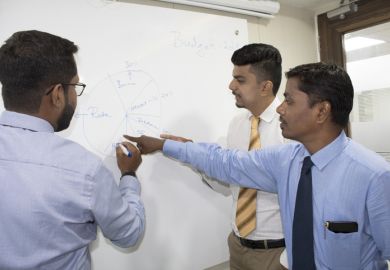It has become commonplace for business schools to play up their roles as societal change agents. For example, INSEAD “champions business as a force for good”, and Northwestern University’s Kellogg School of Management seeks to prepare its students to “create meaningful change in business and society”.
These statements are welcome. After all, business schools have historically received frequent criticism for being self-interested, out-of-touch and elitist. But what does it actually mean for a business school to be a force for good in the world?
One meaning centres around what we teach our students. It is important to get them up to speed on current practice in sustainable supply chains, ESG (environmental, social and governance) investing and so on. It is also valuable to revisit old assumptions that shape the academic curriculum, such as whether the shareholder-oriented view of finance still holds true in a world where people and planet are as important as profits?
Business schools have also recognised that students need to become better at doing, not just knowing, and many get them to do some sort of consulting project for a local or overseas company.
But while these developments are welcome, there is a second meaning to being a force for good in the world, centred not so much around what we teach but who. Unfortunately, there is little progress to report here.
The truth is that many business schools still cater to a tiny slice of wealthy people. An MBA at a good school costs more than $100,000. Undergraduate fees are lower, but application processes favour those from privileged backgrounds. Most schools have generous scholarship programmes, but students most in need of them don’t know where to look or how to make a good application.
Why is this a problem? Simply put, the world needs more and better business education. It builds capability, creates jobs, improves productivity, raises living standards. If we were able to democratise it, we would boost equality and make progress on the biggest problems in the world. And if we brought what we learn from the world back into our local classrooms, we would arm our own students to develop stronger global networks of potential business partners.
I see two complementary paths forward: high-tech and high-touch.
High-tech means making use of advances in digital technology. There are already some big successes. For example, the Khan Academy offers 10,000 free video lessons in 28 languages, reaching 6 million unique users per month. Coursera claims more than 80 million learners, accessing 10,000+ online courses from universities around the world.
Free online learning is great, but it has its limitations. Completion rates are notoriously poor. And business learning is much more than just knowledge – it should be experiential. Time for reflection and socialisation makes learning stickier. AI-enabled tutors can help but they aren’t a complete solution because it’s still just a person talking with a computer.
High-touch means democratising learning through human interaction. It is more laborious than online learning but more effective. No one has cracked high-touch, low-cost business learning, but efforts are under way.
For example, several schools in emerging economies have explicit social missions. Insper in São Paulo was founded to promote the transformation of Brazil through the training of innovative leaders. INCAE in Costa Rica seeks to transform lives in Latin America for a better future. The African Management Institute uses a blended model, with local expertise in such countries as Kenya, Rwanda and Nigeria, plus online courses.
A recent initiative is One League, founded in 2021 by Harvard MBA Umaimah Mendhro. Having grown up in rural Pakistan, she wanted to make world-class education accessible to high-potential people everywhere. It’s a live online MBA taught by top faculty, with students enrolled on the basis of potential, not privilege. The first 90 students represented more than 50 countries, all with full scholarships.
At my own institution, Ivey Business School at Western University, we have been actively experimenting. The 39-Country Initiative (39C) provides free access to Ivey’s very large case-study catalogue to universities in poor countries and face-to-face training in how to use these materials. Ubuntu is a for-credit elective course whereby our students travel to one of five African countries and partner with their peers attending local business schools to show them how to learn from cases and become decision-makers. The LEADER Project involves students travelling to emerging economies post-degree to provide business training to entrepreneurs.
These examples underline the challenges of high-touch learning. One is scalability. Ivey’s 39C has thousands of signed-up faculty, but not all are using the free materials. Ubuntu has reached 5,000 African business students, LEADER has helped 10,000 entrepreneurs. It feels like we are just scratching the surface.
The second challenge is building demand. Many of those who would benefit are sceptical of outside help, and many well-intentioned programmes struggle to attract interest, even when offered for free.
The third is localisation. Business ideas developed in North America don’t always travel well. Effort has to go into building capability in situ, so that learning adapts to the requirements of the local context.
In sum, none of this is easy. But that doesn’t mean we should shy away. By building on the examples discussed here, business schools can become a force for good in a way that they never could by focusing on that tiny slice of privileged individuals at the top of the social pyramid.
Julian Birkinshaw is dean of the Ivey Business School at Western University, Ontario.
Register to continue
Why register?
- Registration is free and only takes a moment
- Once registered, you can read 3 articles a month
- Sign up for our newsletter
Subscribe
Or subscribe for unlimited access to:
- Unlimited access to news, views, insights & reviews
- Digital editions
- Digital access to THE’s university and college rankings analysis
Already registered or a current subscriber?








